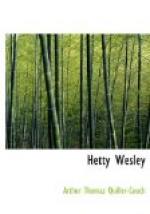About a third of the way down, the track, which trended at first to the left, bent abruptly away to the right, from the edge of a low cliff of rock; and at this corner the men on the drag-ropes must also fling themselves sharply to the right to check the wheels on the verge of the fall. They did so, cleverly enough: but almost on the instant were jerked out of their footholds like puppets. Amid outcries of terror and warning, the outer wheel of the gun broke through the crumbling soil on the verge, the ropes flew through their hands, tearing away the flesh before the flesh could cast off its grip; and with a clatter of stones the gun somersaulted over the slope. With it, caught by the left-hand rope before he could spring clear, went hurling a man. They saw his bent shoulders strike a slab of rock ripped bare an instant before, and heard the thud as he disappeared.
As they ran to view the damage, the two riders came cantering across the gully and joined them. By good fortune, at the base of the rock there welled a tiny spring and spread itself in a miniature bog before making up its mind to leap down the mountain-side and feed the infant waters of the Taptee. Into this plashy soil the gun had plunged and the carriage lay some yards away up-ended on a broken wheel, but otherwise uninjured. Beside the carriage, when the General reached it, an artillery sergeant and three of the team of No. 2 gun were lifting the injured man.
“Badly hurt?”
The sergeant saluted. “We doubt it’s over with him, sir. His back’s broken, seemingly.”
The General turned away to examine the face of the cliff, and almost at once gave vent to a low whistle.
“See here, Ellerton, the rock is caverned and the gun must have broken through the roof. It doesn’t look to me like a natural cavern, either. Hi! half a dozen of you, clear away this rubbish and let me have a nearer look.”
The men turned to and heaved away the fallen stones under which the water oozed muddily.
“Just as I thought! Nature never made a hole like this.”
An exclamation interrupted him. It came from one of the relief party who had clambered into the cavern and was spading there in the loose soil.
“What is it?”
“A skeleton, sir!—stretched here as natural as life.”
The General dismounted and clambered to the entrance, followed by his staff officer. As they reached it, the man stooped again and rose with something in his hand.
“Eh? A begging-bowl?”
“Not a doubt of it,” said the staff officer, as his chief passed it to him. He examined it, turning it slowly over in his hands. “It’s clear enough, though curious. We have struck the den of some old hermit of the hills, some holy man—”
“Who pitched his camp here for the sake of the water-spring, no doubt.”
“Queer taste,” said the staff officer sagely. “I wonder how the deuce he picked up his food.”




